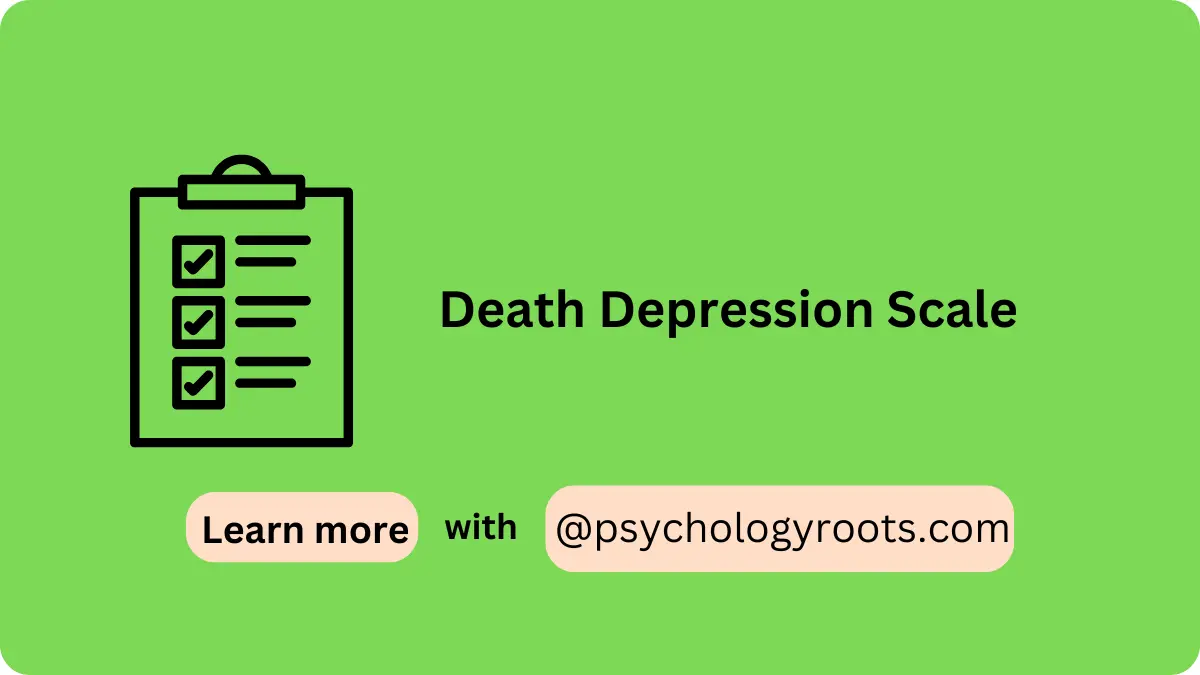Table of Contents
Death Depression Scale
Here in this post, we are sharing the “Death Depression Scale”. You can read psychometric and Author information. We have thousands of Scales and questionnaires in our collection (See Scales and Questionnaires). You can demand us any scale and questionnaires related to psychology through our community, and we will provide you with a short time. Keep visiting Psychology Roots.
About Death Depression Scale
Scale Name
Death Depression Scale
Author Details
Donald I. Templer, Michael Harville, and Hiroko Arikawa
Translation Availability
English

Background/Description
The Death Depression Scale (DDS) is a psychometric tool designed to assess depressive symptoms specifically related to death-related thoughts and feelings. The scale provides a nuanced approach to understanding how individuals emotionally and cognitively process the concept of death, as distinct from generalized depression or anxiety.
Developed by Templer and colleagues, the DDS is often used in clinical, research, and hospice settings to evaluate individuals facing terminal illness, grief, or existential concerns about mortality. This scale is particularly valuable for exploring the psychological impact of death awareness on mental health and quality of life.
Administration, Scoring and Interpretation
- Preparation:
- Provide respondents with a quiet and private space to complete the questionnaire.
- Ensure participants understand the purpose of the scale and encourage honest responses.
- Instructions:
- Explain that the scale is designed to assess their feelings and thoughts related to death.
- Ask respondents to read each item carefully and rate their level of agreement using the provided response options.
- Completion:
- The scale is self-administered and typically takes 10–15 minutes to complete.
- A researcher or clinician should be available to clarify any doubts about the items.
Reliability and Validity
- Reliability:
- The DDS has demonstrated high internal consistency, with a reported alpha coefficient of .87 in initial studies.
- Validity:
- Construct validity is supported by significant correlations with related measures, such as death anxiety and generalized depression scales.
Available Versions
21-Items
Reference
Templer, D. I., Harville, M., Hutton, S., Underwood, R., Tomeo, M., Russell, M., Mitroff, D., & Arikawa, H. (2002). Death Depression Scale-Revised. OMEGA – Journal of Death and Dying, 44(2), 105-112. https://doi.org/10.2190/32L3-DPDA-M4U3-7L81
Important Link
Scale File:
Frequently Asked Questions
Q1: What is the main purpose of the Death Depression Scale?
It measures depressive symptoms specifically associated with death-related thoughts and feelings, offering insights distinct from general depression scales.
Q2: Who can benefit from the DDS?
The scale is beneficial for individuals coping with terminal illness, grief, or existential concerns, as well as researchers studying death-related psychological phenomena.
Q3: How long does it take to complete the DDS?
It typically takes about 10–15 minutes.
Q4: Are there any contraindications for using the DDS?
It should be used cautiously with individuals in acute psychological distress, as the content may exacerbate symptoms in vulnerable populations.
Q5: Is the DDS suitable for cross-cultural research?
While the DDS has been primarily validated in English-speaking populations, additional translations and validations are required for cross-cultural applicability.
Disclaimer
Please note that Psychology Roots does not have the right to grant permission for the use of any psychological scales or assessments listed on its website. To use any scale or assessment, you must obtain permission directly from the author or translator of the tool. Psychology Roots provides information about various tools and their administration procedures, but it is your responsibility to obtain proper permissions before using any scale or assessment. If you need further information about an author’s contact details, please submit a query to the Psychology Roots team.
Help Us Improve This Article
Have you discovered an inaccuracy? We put out great effort to give accurate and scientifically trustworthy information to our readers. Please notify us if you discover any typographical or grammatical errors.
Make a comment. We acknowledge and appreciate your efforts.
Share With Us
If you have any scale or any material related to psychology kindly share it with us at psychologyroots@gmail.com. We help others on behalf of you.